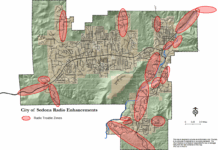
This week the Food and Drug Administration is likely to approve a vaccine for COVID-19, developed by Moderna, a biotechnology company based in Cambridge, Mass.
It is the second of three vaccines developed over the last year to combat the pandemic, all due for distribution soon.
The first vaccine, developed jointly by Pfizer, an American company, and BioNTech, a German lab, was approved for emergency use last week and began distribution over the weekend. The third vaccine, developed by Oxford University and AstraZeneca, a British and Swedish multinational biopharmaceutical company, is set for review later this month.
Some 100 million doses of the Pfizer-BioNTech vaccine are being distributed nationwide. Prior to emergency use approval, the company began producing massive quantities of the vaccine in anticipation of a green light.
As expected with most things in Arizona, our state’s shipment of the vaccines went first to Maricopa and Pima counties, the most populous counties in the state. Yavapai County and hospital officials say we should be receiving the first of our doses this weekend or early next week, with distribution shortly thereafter.
The Pfizer-BioNTech vaccine must be kept at ultra-cold temperatures, which makes distribution difficult, so it’ll likely be administered in medical facilities with specialized freezers where the elements of the vaccine can remain active.
The Moderna vaccine, however, can be kept at less extreme temperatures on par with other vaccines and, when plentiful, will be distributed at more locations in the county and in the state.
The third vaccine, from Oxford-AstraZeneca, can also be kept at less extreme temperatures, like the Moderna vaccine.
On Dec. 1, the Centers for Disease Control and Prevention’s Advisory Council on Immunization Practices approved recommendations for vaccine distribution to be split into three phases prioritizing different groups.
Phase one has three subcategories.
Front-line health care workers, long-term care facility staff and residents, and emergency medical service workers — firefighters and paramedics — were recommended as the priority groups to receive initial doses of vaccine in Phase 1A.
The ACIP defines “health care workers” as both paid employees and volunteers in health care settings “who have the potential for direct or indirect exposure to patients or infectious materials.”
In Phase 1B are teachers and child care workers, law enforcement officers, essential service and critical industry workers, and adults living in congregate settings — e.g. homeless shelters, group homes, prisons and detention centers.
Phase 1C groups are all adults over age 65 and any adults with underlying health conditions putting them at greater risk for severe illness.
Phase 2 includes anyone from a Phase 1 group who did not get a vaccine the first round and anyone in a high-risk group who might suffer disproportionately if they contract COVID-19.
Phase 3 includes everyone else who wants a vaccine.
County officials are currently working on a scheduling program in which Arizona residents can enter their contact information and be notified when they are eligible to get a vaccine.
According to various recent surveys, between 25% and 40% of Americans have no intention of ever getting a vaccine or not getting one for several months until they can be definitively proven to be safe and effective. That’s fine; vaccines are neither compulsory nor mandatory. If you have allergies or cannot take a vaccine, you won’t be forced to take it. If you simply don’t want a vaccine for personal, religious or political reasons, you don’t have to get one. That leaves more vaccines available for those who do want one and will speed up when people in lower risk groups can be immunized.
We are not dispensing medical advice about what to do for that, consult your doctor. In any case, we will keep readers informed about when the various vaccines are available in our area so those who do want one can get one — whether notified by the county or not.
Christopher Fox Graham
Larson Newspapers





















